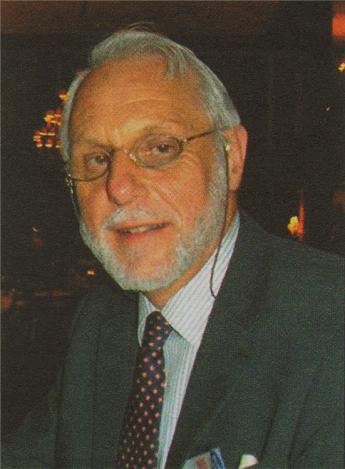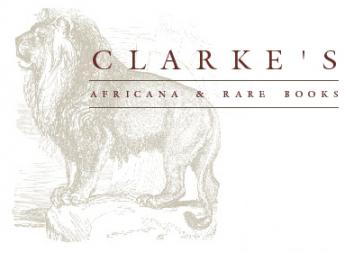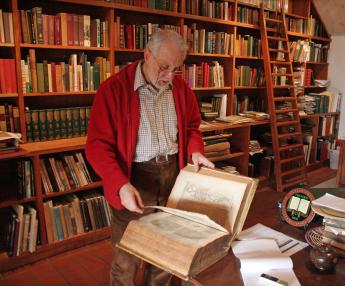Antiquarian Booksellers' Association Clarke's Africana & Rare Books
Only one word is needed integrity

An interview with Paul Mills of Clarkes Africana and Rare Books (Cape Town)
By Barbara Werner van Benthem
Who wins the FIFA World Cup 2010? Spain? Argentina? Brazil? Italy? Or Ghana? Will England loose the penalty shootout? Does Germany reach the semi-finals without Michael Ballack? In three weeks the football world looks to South Africa. We have talked with a South African dealer about the most important thing besides football: rare books.
Clarkes Africana & Rare Books was founded in Constantia (Cape Town) in 1958. Paul and Janet Mills, the proprietors, specialize in books, prints, maps and ephemera on Africa. They issue four catalogues a year on all subjects including African exploration and travel, missionary endeavour, ethnography, Bushmen and rock art, big-game hunting, natural history (botany, ornithology), mining (particularly diamonds and gold), Natal and Zululand, Namibia, art and architecture, literature and politics. Part of their business is an online platform where recognized book dealers who have been vetted before are allowed to sell their books in online auctions. (www.AntiquarianAuctions.com). As a member of the Antiquarian Booksellers Association (ABA) Paul Mills is affiliated to the League, because there is no such association in South Africa. His credo: Only one word is needed integrity.
1. When did you start working in the antiquarian book business?
1975
2. How did you become involved in the business? How did you start?
My first job in the book world was in new book publishing. My ambition was to have my own business and my intention was to start on my own in publishing. Dealing in rare books grew out of my hobby and had the advantage of requiring less capital to get started. So I thought I would begin an old-book selling business, mainly by catalogue, to supplement the eventual publishing of new titles. Somehow this never happened and rare bookselling became all consuming and profitable. I may say that my subsequent forays into publishing have been notably unsuccessful and unprofitable except for a few very limited private-press editions. It seems the smaller the edition the more money you can make as a publisher!
3. What are your major activities?
I have been involved in all of these: shop, catalogues, and the internet. After a couple of years of working from home and catalogue selling I was offered a partnership in an old established antiquarian firm with a busy bookshop and the next twenty years were consumed with this rather frantic activity. When desk-top computers came over the horizon I was slow to see their potential but the advent of the internet very quickly changed that. For me the internet was like a short-sighted person putting on glasses for the first time. Suddenly, beyond the computer on the desk, a whole new world came into focus. We launched a very early website, distributed illustrated catalogues by email and launched the first (and still the only) dedicated online rare book auction site. Now almost all our business is done online via the internet. We have moved the business to offices attached to my home amongst the vineyards of Constantia near Cape Town.
4. Are you specialized?
The bookselling business concentrates on Africana in all its aspects. The auction business handles all suitable antiquarian books.
5. Do you remember the most extraordinary book you ever sold or bought?
My first book which I bought with the hope of reselling it. Not a very remarkable volume
a pirate edition of David Livingstones Missionary Travels and not in very good condition. I still have it. It contains a charming wood engraving of a Cape Lion which I adopted and as logo for the business and which seems to have brought good luck ever since.
6. Do you remember the day you first opened?
An empty desk, no books and some doubt about what to do next.
7. Do you participate in book fairs?
No, never! I have no patience for all the time taken.
8. How many booksellers are there in South Africa?
There are only two ILAB affiliates in South Africa both members of the British ABA.
They are Frank Thorold Ltd in Johannesburg and ourselves, Clarkes Africana & Rare Books in Cape Town. The rest of the trade is organized into the local trade association SABDA the South African Bookdealers Association. Most of them deal in the secondhand area of the trade with Africana, books about Southern Africa, being a major stock-in-trade.
9. What are the major events of the antiquarian book business in your country? Do you have a website, book fairs, publications?
At present SABDA is involved with negotiating its way through a new Act of Parliament which has been introduced to regulate the trade in all second-hand goods in South Africa. The main object of this legislation is to control things such as copper and metal theft, rife in this country, and books have been caught in the net. The Act, as it is presently drafted, has very strict provisions which many of the smaller dealers will find very difficult and time consuming to comply with, but SABDA hopes to be able to negotiate regulations for the Association which will greatly ease matters for its members. It has been a lengthy and frustrating process but there is hope that the outcome will be satisfactory for the trade as a whole. I am an ex-chairman of SABDA and have just come to the end of two terms on the committee after which I am obliged to step down.
10. Do you concentrate on the national or on the international market through book fairs and the internet?
The internet only, by catalogues sent as PDF files, listing on the ILAB website, our own website and by our own online rare book auction business www.antiquarianauctions.com On this site, we and other qualifying dealers (all members of one of the major trade associations) offer books for sale on monthly auctions. All the books are fully described and illustrated on the site and viewing and bidding takes place online. The sales run for a week at a time starting at 16.30 on a Thursday evening and running to the same time the following week. For dealers it offers a way to sell slow moving stock, items outside their normal fields of interest and items taken in on commission from the public. Each dealer sells under his own name buyers. We do not charge a buyers premium which is a very significant advantage. In all it offers dealers a new way of selling and to compete for stock and customers particularly with the established auctioneering firms.
11. Do you see any differences between the markets in Africa and, for example, Asia, Europe or the USA?
South Africa has a long tradition of book buying (we did not have television here until 1976) and so it provides interesting opportunities for buying. Other and large emphasis on Africana here in South Africa this means books dealing mainly with Africa south of the Zambesi the trade is similar to elsewhere. As there are few dealers in a large country book fairs are not a feature of the trade here and there are very few major book auctions.
12. You have been working as a rare book dealer for more than 35 years. What about the former times of the business? Has it changed?
I have been a bookseller since 1975. First on my own account but since 1980 as the proprietor of Clarkes Africana & Rare Books, a firm first started in the 1958 by Tony Clarke who immigrated to South Africa from England after World War II. Clarke was a genuine scholar-bookseller who established a firm with an excellent reputation which we have striven to continue. The internet has changed our business for ever period as the Americans say. The net has exposed what is rare and was is not scarce and limited the value of a booksellers accumulated expertise. The cost of money in modern times means that large holdings of stock can become uneconomic and dealers have to be more nimble and clever in what they buy and how they sell. The net has been both a hindrance and help the new generation of booksellers has had to adapt to this new reality and if successful it can be very profitable with far lower costs than before. Book fairs are waning in importance and it is likely that only the largest fairs will survive and even they may struggle.
13. In two sentences, what is most important for a good rare bookseller?
Only one word is needed integrity. All else will follow.
14. What can the ILAB do for the future of the rare book business?
Move with the times. Dont attempt or protect what is past. Present the best aspects of the new book trade to a new generation of buyers.
15. Finally: Who will win the Football World Cup 2010?
I would love to say South Africa but perhaps even with home-town advantage (and vuvuzelas the plastic horns that South African fans love to blow throughout matches) this is being optimistic. I hope that the whole tournament will be a great success and all who come to South Africa to watch matches will enjoy the beauty and hospitality of our lovely country. If there are a few book collectors amongst them they will find the local dealers to be helpful and eager to provide for their collecting interests.
More information
Clarkes Africana & Rare Books
AntiquarianAuctions online
FIFA World Cup South Africa 2010 the official website
Italy vs Rest of the World Players list of THE football match during the 39th ILAB Congress and 23rd International Antiquarian Book Fair in Bologna
Meet the ILAB booksellers - more interviews on ILAB.org


